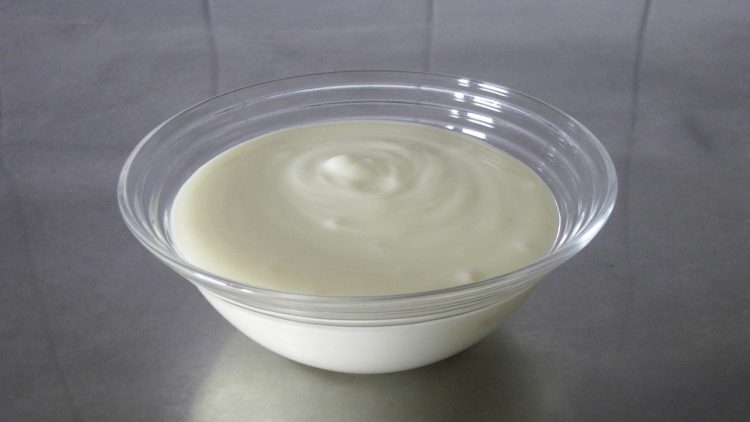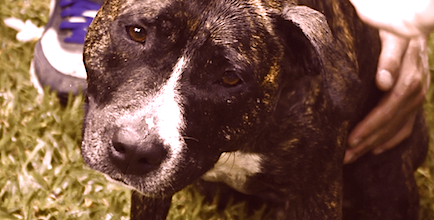Can Dogs Eat Yogurt? A Comprehensive Guide
This versatile and tasty snack leads many to wonder if they can share with their furry friends, so, can dogs eat yogurt? There are some risks to first consider.

- Yes, dogs can eat plain, unsweetened yogurt in moderation, but some may be lactose intolerant.
- It provides probiotics, calcium, and protein, supporting digestion and bone health.
- Avoid flavored yogurts, especially those with xylitol or added sugars, and introduce slowly to watch for digestive issues.
Yogurt, a staple in many human diets, is known for its probiotic benefits, good bacteria, calcium, and protein content. But when it comes to sharing this creamy delight with our furry friends, pet parents often wonder, can dogs eat yogurt? This article explores the benefits, considerations, and possible risks of feeding yogurt to dogs.

Don’t leave your pet’s safety to chance
Sign up for Petful recall alerts today.

Is Yogurt Good for Dogs?
While yogurt can be beneficial, there are some risks to consider:
- Lactose Intolerance: Some dogs are lactose intolerant and may experience gastrointestinal upset after consuming dairy products. Observe your dog closely for signs of discomfort.
- Allergies: Dairy allergies, though less common, can occur in dogs. Symptoms can include itching, redness, and gastrointestinal distress.
- Caloric Intake: Yogurt should be considered a treat and not a dietary staple. It should make up no more than 10% of your dog’s daily caloric intake to avoid weight gain.
How Much Yogurt Can Dogs Eat?
The amount of yogurt a dog can safely consume depends on its size and individual tolerance. Here are some general guidelines based on dog size for how much yogurt dogs can likely eat:
- Extra Small (<10 lbs): Start with less than a teaspoon as a portion.
- Small (10-25 lbs): Begin with 1 teaspoon of plain yogurt for small dogs.
- Medium (25-60 lbs): Start with 1 1/2 teaspoons for a medium dog and gauge their tolerance.
- Large (60-100 lbs): For a large dog, start with about 2 teaspoons of plain yogurt.
- Giant (100+ lbs): Start with around 3 teaspoons or 1 tablespoon.
Remember, these amounts are general guidelines and should not constitute a significant portion of a dog’s diet. Yogurt should be considered a treat, not a staple of their diet. Always monitor your dog for any signs of lactose intolerance or digestive issues after consuming yogurt, and consult with your veterinarian before making any changes to your dog’s diet.
Nutritional Benefits of Yogurt
Yogurt can offer several nutritional health benefits when given in moderation:
- Probiotics: Yogurt contains beneficial bacteria that can help maintain healthy digestion and promote a healthy immune system.
- Calcium and Phosphorus: These minerals are vital for strong bones and teeth.
- Proteins: Essential for muscle development and energy, yogurt provides a good source of easily digestible proteins.
Preparation Tips
Feeding yogurt to dogs can be a healthy treat when done correctly. Here are some preparation tips to ensure that your dog enjoys this treat safely:
- Choose the Right Type of Yogurt: Choose plain, unsweetened yogurt to avoid added sugars and artificial sweeteners, which can be harmful to dogs. Select non-fat or low-fat yogurt to prevent potential issues related to high fat intake, like pancreatitis.
- Introduce Slowly: Start with a small amount to assess your dog’s tolerance to dairy products.
- Monitor: Observe your dog for signs of lactose intolerance or allergic reactions after consuming yogurt. If any negative symptoms occur, discontinue use and consult your veterinarian.
- Moderation is Key: Treat yogurt as a treat, not a meal. It should constitute no more than 10% of your dog’s total daily calorie intake. Too much yogurt can lead to weight gain or digestive issues.
- Avoid Yogurts with Additives: Stay away from yogurts containing xylitol, chocolate, grapes, or any other ingredients that are toxic to dogs.
- Mix with Dog Food: For dogs that enjoy yogurt, you can mix a little bit into their regular food as a way to enhance the flavor and add probiotic benefits.
- Consult Your Veterinarian: Before introducing any new food to your dog’s diet, it’s wise to consult with your veterinarian. Vets can provide guidance based on your dog’s health, size, and nutritional needs.
Following these tips can help you safely incorporate yogurt into your dog’s diet, providing them with a tasty treat that also supports their digestive health.

Allergies
Dogs can have allergies or sensitivities to various components in yogurt, similar to humans. Here are some potential yogurt-related allergies to be aware of in dogs:
- Lactose Intolerance: While not an allergy per se, many dogs are lactose intolerant, meaning they have a hard time digesting the lactose in dairy products, including yogurt. This can lead to gastrointestinal symptoms like stomach pain.
- Milk Proteins: Dogs can be allergic to the proteins found in milk. This type of allergy can cause skin reactions, gastrointestinal upset, and ear infections.
- Artificial Additives: Flavored or sweetened yogurts may contain artificial colors, flavors, or sweeteners like xylitol, which is toxic to dogs.
- Preservatives: Some yogurts contain preservatives to extend their shelf life, and these chemicals can potentially trigger allergic reactions in sensitive dogs.
Symptoms of yogurt allergies in dogs can vary but may include:
- Skin Issues: Symptoms like itching, redness, or hot spots can signal an allergic reaction.
- Gastrointestinal Distress: Can include symptoms like vomiting, diarrhea, and gas.
- Respiratory Problems: In severe cases dogs may exhibit breathing difficulties, wheezing, or coughing as a sign of an allergic reaction.
If you suspect your dog has a yogurt allergy or intolerance, it’s important to stop feeding them yogurt and consult with a veterinarian for proper diagnosis and treatment.
In sum, yogurt can be a healthy, occasional treat for dogs, offering nutrients and other health benefits. However, it’s important to choose the right type of yogurt and monitor your dog’s reaction to it. Always consult with a veterinarian before making any significant changes to your pet’s diet, ensuring that the treats you choose are healthy and suitable for their needs.
Frequently Asked Questions (FAQ)
Can Dogs Eat Yogurt with Fruit?
Dogs can typically eat yogurt with fresh fruit in moderation, but there are a few factors to consider. Plain yogurt without any added sugars or artificial sweeteners is the safest option for dogs. Additionally, some fruits are safe for dogs in small amounts, such as berries or bananas, while others can be toxic. Before feeding your dog yogurt with fruit, it’s best to consult with your veterinarian to ensure it aligns with your dog’s dietary needs and any specific health conditions they may have.
Can Dogs Eat Vanilla Yogurt?
It’s not a good idea to feed your dog flavored yogurt, like vanilla yogurt, because it is likely to have a higher sugar content. Additionally, always check yogurt ingredients for xylitol, which is very toxic to dogs. In general, if you’re going to give your dog some yogurt, it’s best to opt for plain and unsweetened versions.
Can Dogs Eat Greek Yogurt?
Dogs can eat greek yogurt in moderation. However, it is crucial to choose plain, unsweetened Greek yogurt without any added flavors or sweeteners, particularly xylitol, which is toxic to dogs. Before introducing Greek yogurt into your dog’s diet, it’s advisable to start with small amounts to ensure they can digest it without any issues, such as diarrhea or stomach upset. Always consult with your veterinarian before adding new foods to your pet’s diet to ensure they are suitable and safe for your individual pup.
Can Dogs Eat Yogurt Covered Raisins?
Dogs should never eat raisins because they are extremely toxic to them. Keep all raisins and grapes, include raisin snacks, like yogurt covered ones, far away from where your dog can reach them.
What’s the Best Kind of Yogurt for Dogs?
Not all yogurts are created equal, especially when it comes to snacks for your dog. Here’s what to look for:
– Plain and Unsweetened: Flavored yogurts often contain artificial sweeteners, such as xylitol, which is toxic to dogs. Always opt for plain, unsweetened yogurt.
– Low or Non-fat Options: High-fat foods can lead to obesity and pancreatitis in dogs. Choose low-fat or non-fat yogurt to keep it healthy.
Recipes
Here are some simple yogurt-based recipes that can provide a tasty treat for your dog:
Basic Frozen Yogurt Treats:
Ingredients:
- Plain, unsweetened yogurt
Instructions:
- Simply fill an ice cube tray with plain yogurt and freeze it.
- Once solid, pop out a cube as a cool treat for your dog on a hot day.
Pumpkin Yogurt Dog Treats:
Ingredients:
- 1 cup plain yogurt, ½ cup pureed pumpkin (not pie filling)
Instructions:
- Mix the regular yogurt and pumpkin puree until well combined.
- Freeze the mixture in an ice cube tray for a festive and healthy treat.
When preparing these recipes, always use plain, unsweetened yogurt and ensure any additional ingredients are safe and non-toxic for dogs. Always introduce new treats slowly and in moderation to avoid gastrointestinal upset.
Curious about what other foods dogs can eat? Check out these related articles below:







